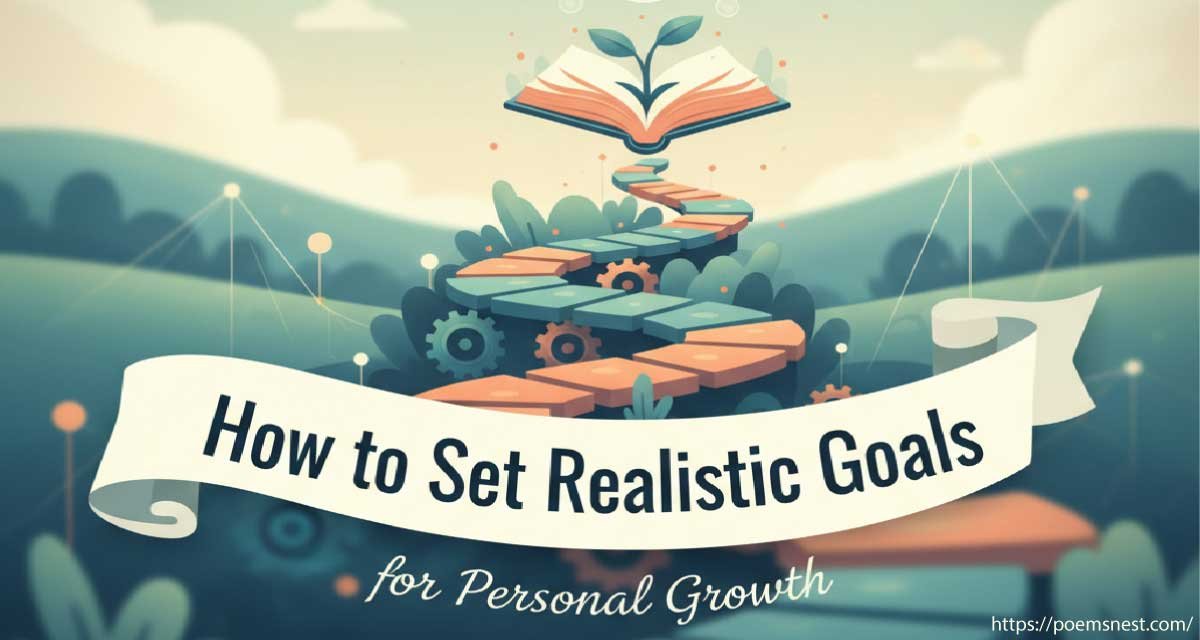Personal growth is a journey, not a destination. We all want to improve ourselves, whether it’s in our careers, relationships, health, or emotional well-being. But many people struggle with setting goals that are achievable and meaningful. Often, we either aim too high and get discouraged or set goals so small that they do not make a real impact. Setting realistic goals is the key to steady, lasting progress.
In this post, I will share practical strategies for setting realistic goals for personal growth. These methods are based on real experiences, psychology, and actionable advice. By the end of this guide, you will know how to define your goals clearly, stay motivated, and track your progress effectively.
Understand What Personal Growth Really Means
Before setting goals, it’s important to understand what personal growth actually is. Personal growth is the continuous process of improving yourself mentally, emotionally, physically, and spiritually. It’s about becoming a better version of yourself, not a perfect one.
Some examples of personal growth include:
-
Learning a new skill or hobby
-
Improving communication or emotional intelligence
-
Building healthier relationships
-
Achieving better work-life balance
-
Developing resilience and self-discipline
Tip: Do not confuse personal growth with external success. Growth is about improvement, not just checking off achievements or comparing yourself to others.
Reflect on Your Current Situation
Before deciding where you want to go, take a moment to assess where you currently are. Reflection helps you understand your strengths, weaknesses, and areas for improvement.
Ask yourself questions like:
-
What are my biggest strengths?
-
Where do I struggle the most?
-
What habits are holding me back?
-
What achievements am I proud of?
Journaling your thoughts can be very helpful here. Writing down your reflections makes them tangible and allows you to identify patterns in your behavior.
Example: If you notice that you procrastinate frequently, a realistic goal might be to develop a daily planning habit, rather than expecting to stop procrastinating overnight.
Set Goals That Are Specific and Clear
Vague goals rarely get achieved. For example, saying “I want to be healthier” is too broad. A more realistic and specific goal would be, “I want to walk 30 minutes every morning and reduce my sugar intake.”
SMART goals are a proven method to make your goals clear:
-
Specific: Clearly define what you want to achieve
-
Measurable: Include a way to track progress
-
Achievable: Make sure it’s possible given your current situation
-
Relevant: Align it with your values and long-term objectives
-
Time-bound: Set a deadline or schedule
By making your goals SMART, you remove confusion and increase your chances of success.
Start Small and Build Momentum
One of the biggest mistakes in personal growth is trying to change too much at once. Big, ambitious goals can be motivating, but they often lead to burnout or frustration if you do not see immediate results.
Start with small, manageable steps. For instance:
-
Instead of aiming to read 50 books in a year, start with one book per month.
-
Instead of trying to meditate for 30 minutes daily, start with 5–10 minutes.
-
Instead of overhauling your diet completely, begin by replacing sugary drinks with water.
Small wins build momentum, and momentum leads to long-term success. Celebrate every step forward, no matter how minor it seems.
Identify Potential Obstacles
Before you begin, think about what might stop you from achieving your goals. Obstacles can be external, like lack of time, or internal, like self-doubt or fear.
By anticipating challenges, you can plan solutions in advance:
-
If time is a problem, schedule your tasks in your calendar.
-
If self-doubt arises, remind yourself of past successes.
-
If motivation dips, find an accountability partner or track progress visually.
Identifying obstacles does not make you pessimistic—it makes you prepared.
Make Your Goals Personal and Meaningful
Goals stick when they matter deeply to you. Ask yourself:
-
Why do I want to achieve this?
-
How will it improve my life?
-
Does it align with my values?
For example, if your goal is to exercise more, connect it to a personal reason, like having more energy to play with your children, rather than just losing weight. Personal meaning adds emotional fuel to your journey.
Create a Plan of Action
A goal without a plan is just a wish. Break your goal into smaller tasks and set deadlines.
Plan:
-
Week 1–2: Research and choose a public speaking course
-
Week 3–6: Practice speaking in front of a mirror
-
Week 7–10: Join a local speaking club or online community
-
Month 4–6: Deliver small presentations and gather feedback
Example: Goal: Improve public speaking skills in 6 months
A clear plan turns a vague ambition into a structured path toward success.
Track Your Progress Regularly
Progress tracking is essential to stay motivated. It also helps you notice when something is not working so you can adjust.
-
Keep a journal or digital log
-
Use apps or planners
-
Set weekly or monthly review sessions
Tracking is not about perfection—it’s about awareness and growth. When you see small improvements over time, it encourages you to keep going.
Stay Flexible and Adjust When Needed
Life is unpredictable, and your goals may need adjustment. Flexibility does not mean giving up; it means being adaptable.
-
If you fall behind, reset your schedule instead of abandoning your goal.
-
If a goal no longer aligns with your values, revise it.
-
Treat challenges as learning opportunities, not failures.
Realistic goal-setting is about progress, not perfection. Even setbacks are part of personal growth.
🛡️ Face challenges with courage — 👉 🌟 Effective Strategies to Overcome Fear and Self-Doubt help you build resilience, boost confidence, and take control of your life. Perfect for anyone ready to conquer worries and step boldly toward their goals!
Build a Support System
Having support can significantly increase your success rate. Surround yourself with people who encourage and inspire you.
-
Share your goals with friends or family
-
Join communities with similar interests
-
Find mentors who have achieved what you aspire to
Support not only motivates but also provides guidance and accountability.
Celebrate Milestones
Acknowledging your achievements keeps you motivated and reinforces positive behavior. Celebrate milestones, whether they’re small or large.
-
Treat yourself to something meaningful
-
Share your progress with your support system
-
Reflect on how far you’ve come
Celebration helps you appreciate the journey and encourages continued growth.
Cultivate the Right Mindset
Your mindset plays a crucial role in achieving personal growth. Two types of mindsets influence your journey:
-
Fixed mindset: Believing your abilities are static and cannot change.
-
Growth mindset: Believing you can improve with effort and learning.
A growth mindset is essential for realistic goal-setting. It allows you to view challenges as opportunities, learn from mistakes, and persist when things get tough.
Tips to cultivate a growth mindset:
-
Replace “I can’t do this” with “I can learn to do this.”
-
Focus on progress, not perfection.
-
Embrace challenges as part of the learning process.
-
Reflect on failures to extract lessons, rather than feeling defeated.
Use Visualization and Positive Affirmations
Visualization is a powerful tool for achieving your goals. When you vividly imagine yourself succeeding, your brain starts to prepare for real-life execution.
-
Spend a few minutes daily picturing yourself achieving your goal.
-
Imagine the steps, the feelings, and the environment around your success.
-
Pair visualization with positive affirmations like:
-
“I am capable of achieving my goals.”
-
“I grow stronger with every step I take.”
-
Visualization combined with affirmations helps your mind stay focused and motivated, even during tough times.
Break Goals Into Daily Habits
Goals are achieved not in a single grand effort, but through consistent daily habits. The key is to translate your bigger goals into small, actionable routines.
Example:
Goal: Improve physical fitness
-
Daily habit: Walk 10,000 steps or do a 20-minute workout
-
Weekly habit: Attend a yoga or strength-training class
Over time, these small habits compound into significant progress. Focus on consistency, not intensity, especially at the beginning.
🌞 Cultivate a brighter outlook — 👉 🌱 Positive Mindset Tips for Personal Growth guide you to embrace optimism, stay motivated, and unlock your full potential. Perfect for anyone aiming to grow mentally, emotionally, and achieve lasting success!
Practice Self-Discipline and Accountability
Self-discipline is the bridge between goals and achievement. Motivation alone is often fleeting, but discipline ensures consistency.
Ways to strengthen discipline:
-
Set clear boundaries for yourself
-
Limit distractions
-
Use time-blocking or task prioritization methods
-
Keep a habit tracker to monitor progress
Accountability also plays a huge role. Share your goals with someone you trust, and provide weekly updates. Knowing someone else is aware of your goals increases commitment and motivation.
Learn to Overcome Setbacks
Setbacks are inevitable, even with realistic goals. What matters is how you respond to them.
Avoid self-criticism: Instead of saying, “I failed,” say, “I learned what doesn’t work.”
Analyze the cause: Identify why the setback happened. Was it poor planning, lack of resources, or unrealistic expectations?
Adjust your plan: Modify your approach without abandoning your goal.
Keep going: Persistence is often the difference between success and failure.
Remember, setbacks are not signs of failure—they are part of the growth process.
Prioritize Goals and Avoid Overloading Yourself
Sometimes we get overambitious and set too many goals at once. This often leads to stress and burnout.
-
List all your goals and identify which ones are most important or time-sensitive.
-
Focus on one to three key goals at a time.
-
Once a goal becomes a habit or milestone is achieved, move on to the next.
Quality matters more than quantity. Realistic growth comes from deliberate, focused effort.
Celebrate the Process, Not Just the Outcome
While achieving a goal is satisfying, the journey itself holds immense value. Celebrate small wins, progress in habits, and moments of learning.
-
Keep a success journal to record achievements, even tiny ones.
-
Reward yourself for sticking to routines or overcoming challenges.
-
Share your journey with others—this reinforces positive behavior.
By valuing the process, you cultivate joy in personal growth rather than just chasing results.
Learn Continuously
Personal growth is fueled by learning. Every day presents an opportunity to improve your skills, mindset, and habits.
-
Read books, take online courses, or attend workshops relevant to your goals.
-
Seek feedback from mentors or peers.
-
Observe people who have achieved what you aspire to accomplish.
Learning keeps your approach fresh and prevents stagnation. Even small daily learning habits create exponential improvement over time.
Maintain Balance and Self-Care
Focusing on growth doesn’t mean neglecting other areas of life. Balance is critical:
-
Prioritize mental health through meditation, journaling, or relaxation
-
Take care of your body with proper sleep, nutrition, and exercise
-
Nurture relationships with friends and family
-
Allow yourself breaks to recharge
Sustainable personal growth requires energy and well-being. Neglecting self-care can undermine even the most realistic goals.
🌅 Start your day the right way — 👉 ⏰ Effective Morning Routines for Productivity and Success help you boost energy, focus, and motivation from the moment you wake up. Perfect for achievers, students, and anyone ready to make every day c
Reflect and Reassess Regularly
Finally, personal growth is an ongoing process. Regular reflection helps you stay aligned with your evolving priorities.
-
Conduct monthly or quarterly reviews of your goals
-
Assess what worked, what didn’t, and why
-
Adjust your goals and strategies as needed
Reflection ensures that your goals remain realistic, relevant, and motivating.
Conclusion: Your Roadmap to Realistic Personal Growth
Setting realistic goals for personal growth is both an art and a science. It’s not simply about writing a list of things you want to achieve; it’s about understanding yourself, your values, and the life you truly want to lead. It requires self-awareness to recognize your strengths and weaknesses, careful planning to map out a path forward, persistence to stay on track even when motivation dips, and the right mindset to embrace challenges and learn from mistakes.
When you set realistic goals, you gain clarity on what truly matters to you. You learn to distinguish between what is essential for your growth and what is merely a distraction. This clarity allows you to focus your energy on meaningful actions rather than spreading yourself too thin or chasing goals that don’t align with your values. In doing so, you build sustainable habits that gradually create lasting change. These habits, once established, become part of your daily routine, making personal growth feel natural and manageable rather than overwhelming or forced.
Additionally, following a realistic approach helps you stay motivated even when challenges arise. Life is unpredictable, and setbacks are inevitable, but having a structured plan and a clear understanding of your priorities allows you to navigate obstacles with confidence. You learn to treat setbacks not as failures, but as opportunities to reassess, adjust, and grow stronger. By celebrating small wins along the way and acknowledging the progress you make, you maintain a positive mindset that fuels your journey forward.
Remember, personal growth is a marathon, not a sprint. It’s about consistent, small steps rather than dramatic overnight transformations. Celebrate every step forward, no matter how small, because each one brings you closer to becoming the person you aspire to be. Learn from setbacks without letting them define you, and always aim for progress, not perfection. The consistent effort, patience, and dedication you invest in yourself today will compound over time, and your future self will thank you for it in ways you may not even fully realize yet. True personal growth is lifelong, and every step you take, no matter how small, is a victory worth recognizing.

Hassan Chaudhry is a poet and writer who explores healing, self-growth, and everyday inspiration. His words come from real experiences and honest reflections — written to heal hearts, spark hope, and remind readers that every moment is a new beginning. He is the creator of Poems Nest, a space where poetry and positivity come together to inspire hearts.

